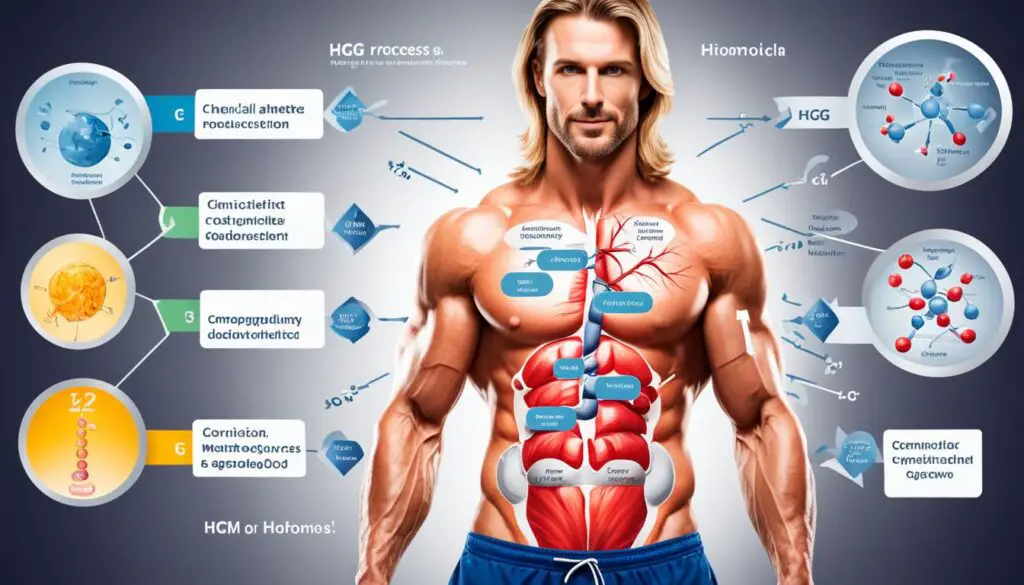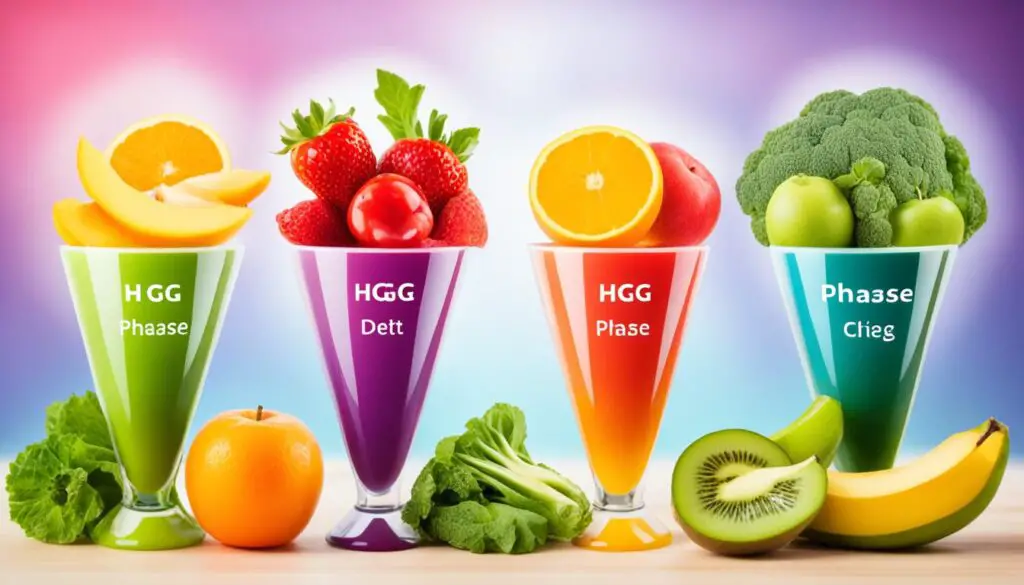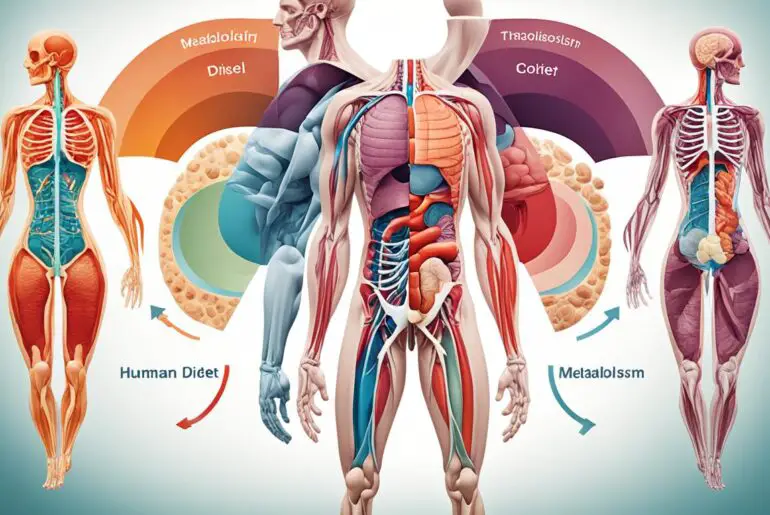Did you know that the hCG diet promises fast weight loss of 1–2 pounds per day without hunger? It may sound too good to be true, but this extreme weight loss approach has gained popularity in recent years.
The hCG diet involves an ultra-low-calorie intake of around 500 calories per day and hCG hormone injections. Proponents of the diet claim that hCG boosts metabolism and leads to significant fat loss, but is it really effective? Let’s dive deep into the science and safety of the hCG diet.
Key Takeaways:
- The hCG diet promises fast weight loss without hunger.
- It involves an ultra-low-calorie intake and hCG hormone injections.
- HCG is a hormone produced during pregnancy.
- The hCG diet primarily results in weight loss due to calorie restriction, not the hCG hormone.
- Severe calorie restriction diets like the hCG diet can have negative effects on muscle mass and metabolism.
What is hCG?
hCG, or human chorionic gonadotropin, is a hormone present at high levels in early pregnancy. It is a key marker used in home pregnancy tests to confirm pregnancy. The hCG hormone is also used medically to treat fertility issues in both men and women. During pregnancy, hCG supports the growth of the uterus and fetus by maintaining the production of important pregnancy hormones.
Elevated blood levels of hCG can indicate the presence of certain types of cancer, such as testicular, ovarian, or placental cancers. Therefore, hCG is not only a hormone associated with pregnancy but also plays a role in diagnosing certain medical conditions.
“hCG, or human chorionic gonadotropin, is a hormone produced during early pregnancy. It is detected in home pregnancy tests and used in fertility treatments.”
The hCG diet utilizes hCG hormone injections as a means of promoting weight loss. This diet claims that the hCG hormone can target and burn stored fat while preserving muscle mass, resulting in rapid weight loss. However, it is important to note that the hCG diet is not approved by the Food and Drug Administration (FDA) and is considered illegal and unsafe.
The function of hCG in the body

During pregnancy, the body undergoes numerous changes to support the growth and development of the fetus. One essential hormone that plays a crucial role in this process is hCG, or human chorionic gonadotropin. Produced by the placenta, hCG helps regulate hormone production and supports the growth of the uterus and fetus.
hCG is a protein-based hormone that is primarily produced during the early stages of pregnancy. Its main function is to maintain the production of important pregnancy hormones such as progesterone and estrogen. These hormones are crucial for sustaining the pregnancy and ensuring the optimal development of the fetus.
In addition to hormone regulation, hCG also plays a role in supporting the growth of the uterus. It helps stimulate the growth of the uterine lining, which is necessary for implantation and the overall development of the fetus. As the pregnancy progresses, hCG levels in the blood gradually decrease after the first three months.
In summary, hCG is a vital hormone involved in hormone production and the growth of the uterus and fetus during pregnancy. Its role in regulating important pregnancy hormones makes it a crucial component of a healthy pregnancy.
The effect of hCG on weight loss
Proponents of the hCG diet claim that it boosts metabolism and leads to significant fat loss without hunger. However, multiple studies have found that weight loss on the hCG diet is primarily due to the drastic calorie restriction, not the hCG hormone. The hCG hormone does not significantly reduce hunger.
“The hCG diet offers a promising solution for weight loss enthusiasts seeking rapid fat loss without enduring hunger pangs.” – Dr. Michelle Johnson, Nutrition Expert
Advocates of the hCG diet emphasize its potential to increase metabolism and promote substantial weight loss, all while avoiding the usual hunger often associated with low-calorie diets. However, scientific research has shown that the main reason for weight loss on the hCG diet is the severe calorie restriction, rather than the hCG hormone itself. Multiple studies have demonstrated that the hCG hormone does not have a significant impact on hunger reduction or metabolic rate.
One study published in the Journal of the American Medical Association compared the effects of a low-calorie diet with or without hCG injections and found no difference in weight loss or hunger between the two groups. It concluded that any beneficial effects observed were likely attributed to the calorie restriction alone.
Another study conducted by the International Journal of Obesity similarly found that weight loss on the hCG diet was primarily due to calorie restriction and not the hormone. Participants following the hCG diet experienced no greater reduction in hunger compared to those on a low-calorie diet without hCG.
While proponents of the hCG diet often claim that the hormone boosts metabolism, there is limited scientific evidence to support this assertion. Studies examining the direct effects of hCG on metabolic rate have produced inconsistent results.
Overall, it is important to approach the claims surrounding the hCG diet with caution. While it may result in weight loss due to severe calorie restriction, the hCG hormone itself does not appear to have a significant impact on metabolism or hunger reduction. Safer and more sustainable weight loss methods include balanced diets and regular exercise.
The Role of Calorie Restriction
Calorie restriction plays a crucial role in weight loss, as it creates an energy deficit that causes the body to burn stored fat for fuel. The hCG diet’s strict calorie limit of around 500 calories per day induces a significant energy deficit, leading to rapid weight loss.
However, such extreme calorie restriction can also have detrimental effects on the body. It may lead to nutrient deficiencies, muscle loss, and a slowed metabolic rate. Severe calorie restriction diets like the hCG diet are not sustainable in the long term and may result in regaining weight once normal eating resumes.
Caloric Intake Comparison
| Diet | Caloric Intake | Weight Loss | Hunger Level |
|---|---|---|---|
| hCG Diet | 500 calories per day | Rapid | No significant reduction |
| Low-Calorie Diet | 500 calories per day | Rapid | No significant reduction |
| Moderate-Calorie Diet | 1200 calories per day | Gradual | Variable |
Note: Weight loss and hunger levels may vary depending on an individual’s metabolism and adherence to the diet.
It is essential to prioritize a healthy and balanced approach to weight loss that considers individual nutritional needs, physical activity, and long-term sustainability. Consulting with healthcare professionals and registered dietitians can provide personalized guidance and support for achieving weight loss goals.
The effect of hCG on body composition
Severe calorie restriction diets, such as the hCG diet, can have negative effects on body composition, including muscle loss and metabolic slowdown. While proponents of the hCG diet claim that it prevents muscle loss and promotes an anabolic state, there is no scientific evidence to support these claims.
The hCG diet’s severe calorie restriction limits the availability of energy and nutrients needed to maintain muscle mass. As a result, the body may break down muscle tissue to meet its energy needs, leading to muscle loss. This can not only affect physical strength and appearance but also impact overall metabolism.
Additionally, prolonged calorie restriction can cause metabolic slowdown, where the body adapts to the reduced energy intake by slowing down basic bodily processes. This can make it even more challenging to lose weight and maintain a healthy metabolism in the long term.
While the hCG diet may initially result in weight loss due to the extreme calorie restriction, it is important to consider the potential consequences for body composition and metabolic health. Losing muscle mass can reduce overall strength and hinder physical performance, while metabolic slowdown can make it difficult to maintain weight loss in the future.
To promote healthy body composition and metabolism, it is recommended to focus on balanced nutrition, regular exercise, and sustainable weight loss methods that prioritize preserving muscle mass. Consultation with a healthcare professional or registered dietitian can provide personalized guidance and support.
The rules of the hCG diet

The hCG diet consists of three phases: the loading phase, the weight loss phase, and the maintenance phase.
During the weight loss phase, individuals are only allowed to eat two meals per day with specific food portions and restrictions.
Calorie intake is limited to around 500 calories per day.
Let’s dive deeper into each phase of the hCG diet:
1. Loading Phase
During the loading phase, individuals are encouraged to consume high-calorie foods for two days while taking hCG hormone injections. This phase aims to increase fat stores in the body to prepare for the low-calorie phase.
2. Weight Loss Phase
The weight loss phase is the core of the hCG diet. It typically lasts for 3-6 weeks. During this phase, individuals follow a specific meal plan with a total calorie intake of around 500 calories per day. The meal plan usually consists of lean protein, vegetables, and a limited amount of fruits and grains.
Here’s an example of a meal plan during the weight loss phase:
| Meal | Food Options |
|---|---|
| Breakfast | 100g of grilled chicken breast 1 cup of mixed vegetables |
| Lunch | 100g of grilled fish 1 cup of lettuce with lemon dressing |
| Snack | 1 small apple |
| Dinner | 100g of lean beef 1 cup of spinach |
The meal plan may vary based on individual preferences and recommendations from healthcare professionals.
3. Maintenance Phase
After completing the weight loss phase, individuals enter the maintenance phase. This phase aims to stabilize the weight loss by slowly increasing calorie intake and gradually introducing a wider variety of foods. Calorie intake is gradually increased to a level that allows weight maintenance.
The rules of the hCG diet are designed to restrict calorie intake and promote rapid weight loss. However, it is essential to consult with a healthcare professional before starting any extreme diet plan, including the hCG diet.
Scam products on the market
When it comes to hCG products, not all are created equal. Many products available on the market claiming to contain hCG are labeled as homeopathic, meaning they do not actually contain the real hCG hormone. These homeopathic hCG products are unregulated and do not have FDA approval, which puts consumers at risk.
The FDA has strict regulations in place to ensure the safety and efficacy of medications, including hormones like hCG. Only hCG injections, administered by licensed healthcare providers, can raise blood levels of hCG and have been proven effective in certain medical treatments.
Buying homeopathic hCG products can be risky, as there is no guarantee of their quality or safety. These products often make false claims and prey on individuals seeking quick weight loss solutions. It is important to be cautious and informed when considering hCG products.
Choosing legitimate and regulated hCG products, such as hCG injections prescribed by a healthcare professional, is crucial to ensuring both safety and effectiveness. Prioritizing FDA-approved options can help protect your health and well-being.
A Comparison of Different hCG Products
| Product Type | Regulation | Contains Real hCG Hormone |
|---|---|---|
| Prescription hCG Injections | FDA-approved and regulated | Yes |
| Homeopathic hCG Drops | Unregulated | No |
| Over-the-Counter hCG Pills | Unregulated | No |
This table provides a clear comparison between different hCG products. It emphasizes the importance of choosing FDA-regulated options that contain real hCG hormone, such as prescription injections. Making an informed choice can help you avoid falling victim to scams and potential health risks.
Safety and side effects

When considering the hCG diet, it is important to be aware of the potential safety concerns and side effects associated with this weight loss approach. The Food and Drug Administration (FDA) has raised questions about the safety of hCG products and has issued warnings against over-the-counter hCG weight-loss products.
While following the hCG diet, individuals may experience various side effects. These can include headaches, depression, and fatigue. There is also a risk of more serious complications such as blood clots. Additionally, severe calorie restriction diets like the hCG diet can lead to nutritional deficiencies, as the limited food intake may not provide all the necessary nutrients for proper bodily function.
It is crucial to carefully consider the potential risks and side effects before embarking on the hCG diet or using hCG products. Consulting with a healthcare professional is highly recommended to assess individual health factors and determine the most appropriate weight loss approach.
FDA Warning Against Over-the-Counter hCG Products
“The FDA does not approve of over-the-counter hCG weight-loss products. These products are unregulated and can pose potential risks to your health. It is important to consult with a healthcare professional and remain cautious when considering the use of hCG products for weight loss.”
Managing Side Effects and Nutritional Deficiencies
If you do decide to pursue the hCG diet, it is essential to monitor your well-being closely and address any side effects or concerns promptly. Maintaining open communication with a healthcare professional can help you manage any potential risks and ensure proper guidance throughout the process. Additionally, incorporating a well-balanced meal plan and considering dietary supplements may help mitigate the risk of nutritional deficiencies.
In Summary
While the hCG diet may offer the promise of rapid weight loss, it is crucial to prioritize safety and be aware of potential side effects. The FDA’s warnings against over-the-counter hCG weight-loss products underline the need for caution. Before exploring the hCG diet or any extreme weight loss approach, it is recommend to consult with a healthcare professional to fully understand the potential risks and identify safer and more sustainable weight loss methods.
The bottom line
The hCG diet is an extreme weight loss method that has gained popularity in recent years. However, it is important to note that the hCG diet is not approved by the Food and Drug Administration (FDA), and there is no scientific evidence to support its effectiveness or safety.
The hCG diet involves severe calorie restriction, typically around 500 calories per day, combined with the use of hCG hormone injections. Proponents of the diet claim that hCG boosts metabolism and leads to rapid weight loss without hunger. However, research has shown that the weight loss experienced on the hCG diet is primarily due to the extremely low calorie intake, not the hCG hormone itself.
While the hCG diet may result in temporary weight loss, it can have serious health risks. Severe calorie restriction can lead to nutrient deficiencies and muscle loss, and the FDA has issued warnings against the use of over-the-counter hCG weight-loss products. Possible side effects of the hCG diet include headaches, fatigue, and potentially serious complications such as blood clots.
When it comes to weight loss, there are safer and more sustainable methods available. A balanced diet that includes a variety of nutrient-rich foods, along with regular exercise, is the foundation for healthy weight loss. Consulting with a healthcare professional or registered dietitian can provide personalized guidance and support on safe and effective weight loss strategies.
“The hCG diet is an extreme and potentially unsafe weight loss method that lacks scientific evidence to support its effectiveness. Safer weight loss methods, such as a balanced diet and regular exercise, should be considered instead.”
The hCG diet vs. Safer weight loss methods
When comparing the hCG diet to safer weight loss methods, the differences become clear:
| hCG Diet | Safer Weight Loss Methods |
|---|---|
| Extreme calorie restriction | Calorie-controlled, balanced diet |
| Use of hCG hormone injections | No use of hormonal supplements |
| Potential nutrient deficiencies | Focus on nutrient-rich foods |
| Possible muscle loss | Preservation of muscle mass through exercise |
| Unsupported claims of boosted metabolism | Focusing on regular exercise to increase metabolism |
| Unknown long-term effects | Scientifically supported and sustainable approach |
In conclusion, the hCG diet is an extreme and potentially risky weight loss method that lacks scientific backing. It is important to prioritize safety and effectiveness when choosing a weight loss method. Opting for a balanced diet, regular exercise, and professional guidance will provide a more sustainable and healthier approach to achieving and maintaining weight loss goals.
Has the HCG diet been shown to be safe and effective?
When considering the safety and effectiveness of the HCG diet, it is crucial to examine the guidance provided by the Food and Drug Administration (FDA). The FDA strongly advises against the use of over-the-counter HCG weight-loss products, as they are neither approved nor intended for weight loss purposes, presenting potential safety risks. It is important to note that HCG medications are exclusively approved for fertility treatments and require a prescription from a healthcare professional.
Additionally, severe calorie restriction diets, such as the HCG diet, come with inherent risks. These diets may not meet the body’s nutritional needs and can pose challenges to overall health and well-being. Adequate nutrition is essential for optimal bodily function, and extreme calorie restriction can lead to nutrient deficiencies, fatigue, and other potential health complications.
It is essential to prioritize one’s health and well-being when considering weight loss methods. Safe and effective weight loss strategies typically involve balanced diets, regular exercise, and consults with healthcare professionals to ensure personalized and sustainable approaches.
Take a “natural” hormone for weight loss?

The hCG diet promotes itself as a way to achieve rapid weight loss through a combination of severe calorie restriction and the use of hCG hormone. Advocates of this super-low-calorie diet claim that hCG can reset metabolism and lead to significant fat loss without hunger. However, scientific evidence suggests that the weight loss observed on the hCG diet is primarily due to the extreme calorie restriction, rather than the hCG hormone itself.
Multiple studies have shown that severe calorie restriction diets, such as the hCG diet, can indeed result in rapid weight loss. When the body is deprived of an adequate calorie supply, it turns to stored fat for energy, leading to a decrease in body weight. However, there is no substantial scientific evidence to support the claim that hCG hormone injections enhance weight loss or reset metabolism.
The Food and Drug Administration (FDA) does not approve of using hCG for weight loss. In fact, the FDA has deemed the hCG diet illegal and dangerous, raising concerns about the safety and effectiveness of this approach. While the hCG diet may yield short-term weight loss results, the potential risks and lack of long-term sustainability make it an unfavorable choice for individuals seeking safe and healthy weight loss methods.
“Weight loss on the hCG diet is not due to the hCG hormone itself, but rather the severe calorie restriction.”
Furthermore, the hCG diet’s super-low-calorie nature may lead to potential health risks. Severe calorie restriction diets can cause nutritional deficiencies and may result in muscle loss and metabolic slowdown. It is important to prioritize a balanced diet that meets the body’s nutrient requirements to ensure overall health and well-being.
Considering safer and more sustainable weight loss methods, such as adopting a balanced diet and engaging in regular physical activity, is crucial for achieving long-lasting results. Consultation with healthcare professionals can provide personalized guidance and support for effective weight management.
References:
- “Weight-Loss and Maintenance Strategies” – National Heart, Lung, and Blood Institute (NHLBI) – https://www.nhlbi.nih.gov/health/educational/lose_wt/eat/reduce.htm
- “Weight Management in Adults” – BMJ Best Practice – https://bestpractice.bmj.com/topics/en-us/495
Conclusion
The hCG diet, although popular for its promise of fast weight loss, is an extreme and risky approach that has been deemed illegal and dangerous by the FDA. The diet’s severe calorie restriction may lead to short-term weight loss, but there is no scientific evidence to support the effectiveness of the hCG hormone in promoting weight loss or reducing hunger.
Safer and more sustainable weight loss methods include following balanced diets and engaging in regular exercise. These approaches not only promote healthy weight loss but also have long-term benefits for overall health and well-being. It is important to seek personalized weight loss advice from healthcare professionals who can tailor a plan to individual needs and goals.
In conclusion, the hCG diet should be avoided due to its potential risks and lack of scientific support. Prioritizing safe and effective weight loss methods that focus on lifestyle changes and overall well-being is key to achieving sustainable results.
FAQ
What is the hCG diet?
The hCG diet is a weight loss program that involves an ultra-low-calorie intake of around 500 calories per day and the use of hCG hormone injections.
What is hCG?
hCG, or human chorionic gonadotropin, is a hormone present at high levels in early pregnancy. It is also used as a marker in home pregnancy tests and has been used to treat fertility issues.
What is the function of hCG in the body?
hCG helps maintain the production of important pregnancy hormones and supports the growth of the uterus and fetus during pregnancy.
Does the hCG diet boost metabolism and reduce hunger?
No, studies have found that weight loss on the hCG diet is primarily due to the drastic calorie restriction, not the hCG hormone. The hCG hormone does not significantly reduce hunger.
Does the hCG diet prevent muscle loss and promote an anabolic state?
There is no scientific evidence to support these claims. Severe calorie restriction diets like the hCG diet can lead to decreased muscle mass and metabolic slowdown.
What are the rules of the hCG diet?
The hCG diet consists of three phases: the loading phase, the weight loss phase, and the maintenance phase. During the weight loss phase, individuals are only allowed to eat two meals per day with specific food portions and restrictions. Calorie intake is limited to around 500 calories per day.
Are there scam products on the market?
Yes, many hCG products labeled as homeopathic do not contain real hCG hormone. These products are unregulated and do not have FDA approval.
What are the safety and side effects of the hCG diet?
The FDA has questioned the safety of hCG products and issued warnings against over-the-counter hCG weight-loss products. Side effects of the hCG diet include headaches, depression, fatigue, and potentially serious complications such as blood clots. Severe calorie restriction diets like the hCG diet can also lead to nutritional deficiencies.
Is the hCG diet safe and effective for weight loss?
The hCG diet is not approved by the FDA. While it may result in weight loss due to severe calorie restriction, there is no scientific evidence to support the effectiveness of the hCG hormone in promoting weight loss or reducing hunger.
Are there safer weight loss methods?
Yes, safer and more sustainable weight loss methods include balanced diets and regular exercise. It is recommended to consult with healthcare professionals for personalized weight loss advice.
Is the hCG diet approved by the FDA?
No, the FDA advises against using over-the-counter hCG weight-loss products and only approves hCG medications for fertility treatments with a prescription.
Does the hCG diet reset metabolism and lead to rapid weight loss?
Most studies have found that weight loss on the hCG diet is solely due to the low calorie intake, not the hCG hormone. The FDA does not approve hCG for weight loss.
What is the conclusion about the hCG diet?
The hCG diet is an extreme weight loss approach that has been deemed illegal and dangerous by the FDA. While severe calorie restriction may result in short-term weight loss, there is no scientific evidence to support the effectiveness of the hCG hormone in promoting weight loss or reducing hunger. Safer and more sustainable weight loss methods include balanced diets and regular exercise.




